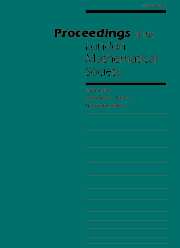Crossref Citations
This article has been cited by the following publications. This list is generated based on data provided by Crossref.
Bruin, N.
Győry, K.
Hajdu, L.
and
Tengely, Sz.
2006.
Arithmetic progressions consisting of unlike powers.
Indagationes Mathematicae,
Vol. 17,
Issue. 4,
p.
539.
Győry, Kálmán
2006.
More Sets, Graphs and Numbers.
Vol. 15,
Issue. ,
p.
143.
Saradha, N.
and
Shorey, T.N.
2008.
Almost perfect powers in consecutive integers (II).
Indagationes Mathematicae,
Vol. 19,
Issue. 4,
p.
649.
Levin, Aaron
2009.
Variations on a theme of Runge: effective determination of integral points on certain varieties.
Journal de théorie des nombres de Bordeaux,
Vol. 20,
Issue. 2,
p.
385.
Győry, K.
Hajdu, L.
and
Pintér, Á.
2009.
Perfect powers from products of consecutive terms in arithmetic progression.
Compositio Mathematica,
Vol. 145,
Issue. 4,
p.
845.
Yang, Shichun
Togbé, Alain
and
He, Bo
2011.
Diophantine equations with products of consecutive values of a quadratic polynomial.
Journal of Number Theory,
Vol. 131,
Issue. 10,
p.
1840.
Flatters, Anthony
2011.
Power values of certain quadratic polynomials.
Journal de théorie des nombres de Bordeaux,
Vol. 22,
Issue. 3,
p.
645.
Hajdu, L.
and
Kovács, T.
2011.
Almost fifth powers in arithmetic progression.
Journal of Number Theory,
Vol. 131,
Issue. 10,
p.
1912.
Hong, Shaofang
and
Qian, Guoyou
2011.
The least common multiple of consecutive arithmetic progression terms.
Proceedings of the Edinburgh Mathematical Society,
Vol. 54,
Issue. 2,
p.
431.
Narkiewicz, Władysław
2012.
Rational Number Theory in the 20th Century.
p.
195.
QIAN, GUOYOU
TAN, QIANRONG
and
HONG, SHAOFANG
2012.
THE LEAST COMMON MULTIPLE OF CONSECUTIVE TERMS IN A QUADRATIC PROGRESSION.
Bulletin of the Australian Mathematical Society,
Vol. 86,
Issue. 3,
p.
389.
FILASETA, M.
LAISHRAM, S.
and
SARADHA, N.
2012.
SOLVING n(n + d) ⋯ (n + (k - 1)d) = by2WITH P(b) ≤ Ck.
International Journal of Number Theory,
Vol. 08,
Issue. 01,
p.
161.
Győry, Kálmán
2013.
Erdős Centennial.
Vol. 25,
Issue. ,
p.
311.
Godinho, Hemar
Porto, Thiago
and
Togbé, Alain
2014.
On the diophantine equation v(v+1)=u(u+a)(u+2a).
Acta Mathematica Hungarica,
Vol. 143,
Issue. 1,
p.
249.
Tengely, Szabolcs
and
Varga, Nóra
2015.
Rational function variant of a problem of Erdös and Graham.
Glasnik Matematicki,
Vol. 50,
Issue. 1,
p.
65.
Rouse, Jeremy
and
Yang, Yilin
2016.
Three consecutive almost squares.
International Journal of Number Theory,
Vol. 12,
Issue. 04,
p.
969.
Tengely, Sz.
and
Ulas, M.
2016.
On products of disjoint blocks of arithmetic progressions and related equations.
Journal of Number Theory,
Vol. 165,
Issue. ,
p.
67.
Bennett, Michael A.
and
Siksek, Samir
2016.
Rational points on Erdős–Selfridge superelliptic curves.
Compositio Mathematica,
Vol. 152,
Issue. 11,
p.
2249.
Tengely, Szabolcs
2016.
On a problem of Erdős and Graham.
Periodica Mathematica Hungarica,
Vol. 72,
Issue. 1,
p.
23.
Zhang, Y.
2018.
On products of consecutive arithmetic progressions. II.
Acta Mathematica Hungarica,
Vol. 156,
Issue. 1,
p.
240.

